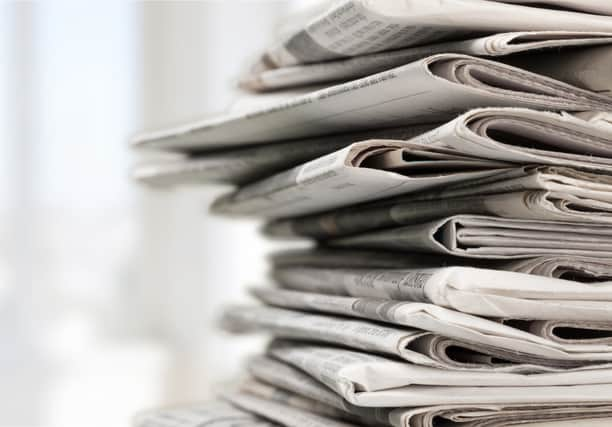Here’s why it’s unlikely you’ll catch coronavirus from newspapers


How long covid-19 can survive on surfaces and objects is a question many people are asking at the moment.
But does coronavirus live on paper and can you catch it from newspapers?
Here’s what you need to know.
How long can coronavirus survive on surfaces?
Advertisement
Hide AdAdvertisement
Hide AdAt the moment, it’s not known exactly how long the virus can survive on objects and surfaces.
The World Health Organization (WHO) explains: “It is not certain how long the virus that causes COVID-19 survives on surfaces, but it seems to behave like other coronaviruses.
“Studies suggest that coronaviruses (including preliminary information on the COVID-19 virus) may persist on surfaces for a few hours or up to several days.
“This may vary under different conditions (e.g. type of surface, temperature or humidity of the environment).”
Advertisement
Hide AdAdvertisement
Hide AdWHO advise that if you think a surface may be infected, “clean it with a simple disinfectant to kill the virus and protect yourself and others. Clean your hands with an alcohol-based hand rub or wash them with soap and water. Avoid touching your eyes, mouth, or nose.”
Does coronavirus live on paper?
However, scientists and health experts have confirmed that newspapers are not transmitters of Covid-19, due to both the ink and the printing process that they go through.
Virologist George Lomonossoff, recently told BBC Radio Scotland: “Newspapers are pretty sterile because of the way they are printed and the process they’ve been through (to be produced).”
Speaking on Good Morning Britain last week, GP and health broadcaster, Dr Hilary Jones, also said: "For public health information right now it's important people have access to information through newspapers.”
Advertisement
Hide AdAdvertisement
Hide AdHe added: "If someone physically picks them up and delivers them to a doorstep or letterbox it's safe."
WHO adds: “The likelihood of an infected person contaminating commercial goods is low and the risk of catching the virus that causes Covid-19 from a package that has been moved, travelled, and exposed to different conditions and temperature is also low”.
This reassurance also extends to both Royal Mail and Amazon packages.
How is coronavirus spread?
WHO explains that, “People can catch COVID-19 from others who have the virus.
Advertisement
Hide AdAdvertisement
Hide Ad“The disease can spread from person to person through small droplets from the nose or mouth which are spread when a person with COVID-19 coughs or exhales. These droplets land on objects and surfaces around the person.
“Other people then catch COVID-19 by touching these objects or surfaces, then touching their eyes, nose or mouth.
“People can also catch COVID-19 if they breathe in droplets from a person with COVID-19 who coughs out or exhales droplets.”
However, the NHS notes that, “It's very unlikely it can be spread through things like packages or food.”
How to reduce the spread of infection in your home
Advertisement
Hide AdAdvertisement
Hide AdThe NHS said: “You'll need to stay at home if you have symptoms of coronavirus (COVID-19) or live with someone who does.”
The NHS explains that while you're staying at home, you should:
wash your hands with soap and water often, for at least 20 secondsuse hand sanitiser gel if soap and water are not availablecover your mouth and nose with a tissue or your sleeve (not your hands) when you cough or sneezeput used tissues in the bin straight away and wash your hands afterwardsclean objects and surfaces you touch often (like door handles, kettles and phones) using your regular cleaning products
How to avoid catching and spreading coronavirus (social distancing)
The NHS notes, “Everyone should do what they can to stop coronavirus spreading.
“It is particularly important for people who:
Advertisement
Hide AdAdvertisement
Hide Adare 70 or overhave a long-term conditionare pregnanthave a weakened immune system
Do
wash your hands with soap and water often – do this for at least 20 secondsalways wash your hands when you get home or into workuse hand sanitiser gel if soap and water are not availablecover your mouth and nose with a tissue or your sleeve (not your hands) when you cough or sneezeput used tissues in the bin immediately and wash your hands afterwardsavoid close contact with people who have symptoms of coronavirusonly travel on public transport if you need towork from home, if you canuse phone, online services, or apps to contact your GP surgery or other NHS services
Don't
touch your eyes, nose or mouth if your hands are not cleanhave visitors to your home, including friends and family